Jazz Perspective: Zev Feldman – A Sherlock of a Producer with an Impressive Portfolio
By Steve Elman
Zev Feldman is becoming one of the great sleuth-producers of our time, and his name is becoming a marker of quality.
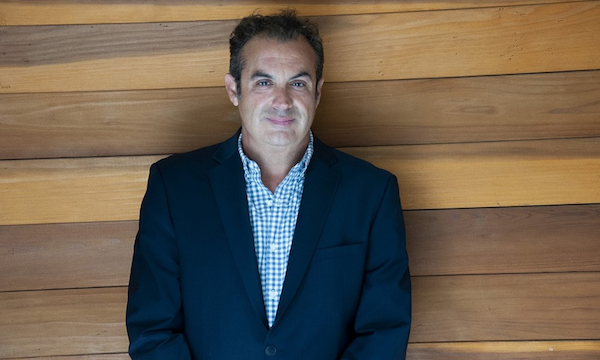
Producer and “Jazz Detective” Zev Feldman. Photo: :Zak Shelby- Szyszko
Arts Fuse jazz writers (myself included) were very intrigued by a recent quintet of releases featuring music that had never been commercially available before, all of which dropped by Record Store Day, April 20.
In other posts, Steve Provizer offered his observations on Chet Baker & Jack Sheldon – In Perfect Harmony: The Lost Album [1972] (Jazz Detective / Elemental). Michael Ullman reviewed Sun Ra – At the Showcase: Live in Chicago 1976 – 1977 (Jazz Detective / Elemental). I waxed on about Art Tatum – Jewels in the Treasure Box [1953] (Resonance), Mal Waldron & Steve Lacy – The Mighty Warriors [1995] (Elemental), and Yusef Lateef – Atlantis Lullaby: The Concert from Avignon [1972] (Elemental), and in the same post I offered my own observations on the Sun Ra release.
There is one name common to each of these five recordings: Zev Feldman is shown as producer or co-producer.
So who is Zev Feldman? If you don’t know his name, you should remember him and look for “Produced for Release by Zev Feldman” when you hear about a new discovery of unreleased jazz. Feldman is becoming one of the great sleuth-producers of our time, and his name is becoming a marker of quality.
In 2019, Chris Morris in Variety elegantly referred to him as “possibly the most widely admired archival producer working in the jazz field today.” Feldman styles himself a “Jazz Detective,” using those words as the name for his own record label and as the name of his 4-part radio series on Real Jazz (heard on the Sirius / XM satellite radio channel in April).
The latest five releases are only the most current additions to a discography that now numbers almost 50 recordings bearing his name.
He’s also Co-President of Resonance Records and a consulting producer of archival and historical recordings for Blue Note Records.
I recently had the chance to speak to Feldman in telephone interviews, and I learned about his distinctive mix of music passion and real-world know-how.
Feldman’s long experience with music retailing – on both sides of the counter – has given him a good sense of what is worthwhile musically and what people want to buy. That combination of instincts has been crucial to his success in the marketplace.
Feldman, who turns 50 this year, reminisced about his early life as a record store hound for a 2022 article in The Washington Post, where he said, “Record stores have always been the center of my universe.”

Producer Zev Feldman, who is not shy about promoting his radio show.
In my conversation with him, he said that he’s been shopping in them since the 1970s. He remembered one record shop that was located next to a Buster Brown shoe store. When he was five years old, he says, “I had an allowance [from my parents] for cleaning the table [after dinner] . . . If I was a good boy [when the family went shopping for kids’ shoes at Buster Brown], I got to go to the record store after . . . My grandparents’ house was a couple of blocks from a record store in Milwaukee. . . . I could lose myself for hours and hours in record stores . . . It was such a pleasure to go into a store and browse the bins, look at the bargains, be surprised by something you didn’t know about . . . I got a degree in [record store] shopping.”
A career in the biz was an early passion. “Retail is a huge part of me and my upbringing. It’s a part of my DNA. I’ll never forget being told I was too young to work at Nobody Beats the Wiz.” He eventually became what used to be called a jobber, calling on retail record stores to ask them to carry the releases he was repping, restocking the shelves, being attentive to what was moving (and what wasn’t). And it wasn’t all that lucrative – even at the age of 20, he was working overnight in a gas station in a second job to supplement his work for a record company.
His first fourteen years in music were spent in sales and marketing, but remarkably, this never dulled his ear for quality. He was and remains a passionate fan of artistic achievement, and his interests cover a wide range of styles. If you look at the jazz releases he’s chosen to produce recently (see below), you’ll find an eclectic list, from Sister Rosetta Tharpe and Cannonball Adderley to Eric Dolphy and Albert Ayler. His driving criterion: “Is it good music or great music?”
He credits George Klabin of Resonance Records with giving him the opportunity to become an archival producer and to reach the position of influence he has today. “[Klabin] said, ‘If you can go out and find never-before-released jazz, and I like the music, I’ll let you produce it.’ He’s given me an education – allowed me to make mistakes. I’ve been doing it for fourteen years now.”
People may imagine what a record producer does, but most outside the business cannot imagine the level of detail that occupies a real producer’s daily life. And every production job is a bit different. In Feldman’s case, the process begins with finding and identifying recordings with artistic merit that will have potential in the marketplace.
“[My work is] investigative music journalism. I only do projects I’m passionate about. I have turned down projects [where the music wasn’t of interest to me. If I decide to take on a project,] I need to find the family [of the deceased artists] and learn who controls [that is, has the rights to] the recordings. We have to negotiate payments for the release.” He also contacts the living musicians on the recording to get their permission and to compensate them for their work. “If we can’t get ahold of the [proper people], we can’t do the project.”
Then there’s the tape work. “I look at the [recordings to determine possible] side breaks, transitions.” If the recording isn’t first-rate, he may sit in and advise as engineers bring them up to acceptable standards.
Feldman takes particular pride in the packages that surround his recordings. “It’s not just about the music – [the package should be] something artistic – elegant, regal, gorgeous, something that knocks people out.”
“I have serious involvement in the art direction. I really enjoy curating a magazine-style approach to the package, telling a narrative – having a great writer [for the principal essay], deciding who we want to interview [for supplemental material], sourcing the photos, finding the right designers.” He solicits input from people who knew the artists, people who respect their work, club owners who employed them. And he conducts many of the interviews with living musicians himself. “I don’t just do Q & A [and put out a raw text] – I work with an editor and condense the person’s remarks.” He also researches and captures venue memorabilia, newspaper clippings, and other miscellany to add authentic flavor to the resulting “magazine.” And then there are the finishing touches. “I choose the photos for the covers, decide which pictures to use inside[, etc.]. I’m one person. But I have a team of people who make it possible . . . investors, label owners, publicity . . . “
Recent developments in the business, with the resurgence of the popularity of vinyl LPs, have added new responsibilities. Feldman has decided to make vinyl versions of his releases available only in limited editions, to make them more collectible.
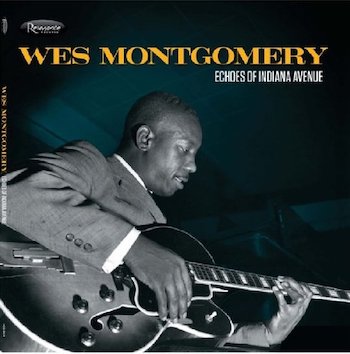
One of Zev Feldman’s first efforts as an archival producer, from 2012.
The results speak for themselves. The average CD or LP buyer is usually dazzled by the beauty of Feldman’s packages, their distinctive design, and the way they stand out when compared to other releases coming to the market. He says, “It’s like buying a piece of art.”
He sums up where he is today: “I’m so lucky. I’m having the time of my life.”
Understandably, Record Store Day (RSD), celebrated on April 20 this year, has particular resonance for him, as it has in many previous years. Feldman wanted all of his current crop of releases to be available by that date.
The origin and raisons d’etre for RSD are summarized well on its website: “Record Store Day was conceived in 2007 at a gathering of independent record store owners and employees as a way to celebrate and spread the word about the unique culture surrounding nearly 1400 independently-owned record stores in the US and thousands of similar stores internationally. The first Record Store Day took place on April 19, 2008. Today, Record Store Day is celebrated at independently-owned brick-and-mortar record stores around the world. ”
Having a series of deluxe vinyl packages in the windows gives record store owners something special for the collectors, and the CD versions allow those owners to continue to stock the same valuable music after the limited editions have been snapped up.
Feldman knows he is standing on the shoulders of other producers, and the recent death of his friend Michael Cuscuna of Mosaic Records put this at top of mind for him.
He cites many producers he admires, including Don Schlitten (of Xanadu Records) and Richard Seidel (of Contemporary Records, the Verve Music Group, Mercury / EmArcy, etc.).
“And Michael – the man was a giant, a larger-than-life figure. I’m at a loss to fully articulate his brilliance, his wit, his enormous knowledge of music. He inspired me, but I could never hold a candle to him.
“[Cuscuna] was the godfather [of archival producers] in many aspects. When I look back at people who inspired me, Michael is one of the most important. When I was getting into jazz, Blue Note was the gateway – buying those albums, learning about the music – and always Michael’s name was there in the credits. And I cherish those boxed sets [archival recordings that Cuscuna produced on his own label, Mosaic]. He’s left an enormous footprint and work that will live for generations.
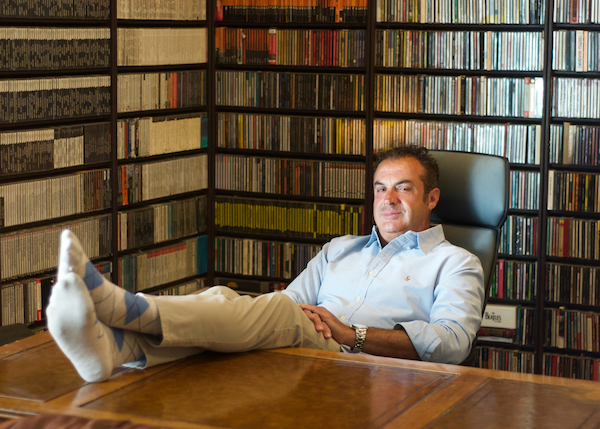
Producer Zev Feldman relaxing. Photo: Zak Shelby-Szyszko
“I was privileged to get to know him – this was someone I idolized. I developed the personal relationship because of George Klabin [Feldman’s co-president at Resonance Records]. Michael and Klabin go back to the mid-1960s, when George had a radio show on WKCR [Columbia University’s radio station, serving the New York City metro]. Cuscuna used to call in [to Klabin’s show] and win tickets to concerts. When I started at Resonance, I got to know Michael through George. I would come to New York, take the train to Stanford [CT, where Cuscuna’s Mosaic Records has its offices], Michael would pick me up, and we would go out to lunch.
“Life is fleeting. It’s so important, what we’re doing in this preservation [of important jazz recordings]. [Archival producers] are a lens into another time in our country’s music and our country’s history.”
More:
Here is a wide-ranging and illustrative audio interview with Michael Cuscuna, conducted by Jake Feinberg.
In addition to the five releases mentioned above, Feldman also produced another two sets which dropped before Record Store Day 2024:
Sister Rosetta Tharpe – Live in France: The 1966 Concert in Limoges (INA / Deep Digs) Reviewed on the Fuse.
Shelly Manne – Jazz from the Pacific Northwest [Monterey Jazz Festival, 1958 & the Penthouse, Seattle WA, 1966] (Reel to Real)
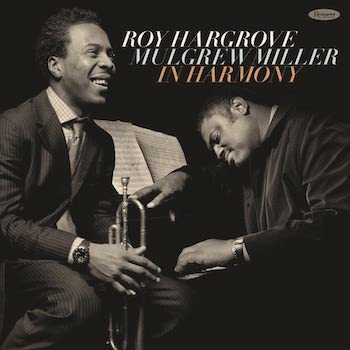
An exquisite set of duets by trumpeter Hargrove, who died in 2018, and pianist Miller, who died in 2013. It was released in 2021 and co-produced by Zev Feldman, Larry Clothier and George Klabin.
Below is a discography of historic recordings produced or co-produced by Zev Feldman that were released in 2022 and 2023 (including, for completeness, an Ahmad Jamal release from 2021). This will show Feldman’s wide-ranging taste and give an idea of his prolific output. Many are available as downloads via Bandcamp. Some also are available in whole or in part via Spotify.
Albert Ayler – Revelations: The Complete ORTF Fondation Maeght Recordings (Elemental)
Cannonball Adderley – Burnin’ in Bordeaux: Live in France 1969 [Alhambra Theatre, Bordeaux] (Elemental)
Cannonball Adderley – Poppin’ in Paris: Live at L’Olympia 1972 (Elemental)
Chet Baker – Blue Room: the 1979 Vara Studio Sessions in Holland (Jazz Detective)
Walter Bishop Jr. – Bish at the Bank: Live in Baltimore [Madison Club, 1966 & Famous Ballroom, 1967] (Reel to Real)
Eric Dolphy – Musical Prophet: the Expanded 1963 New York Studio Sessions (Resonance) This release presented remastered reissues of Dolphy’s Conversations and Iron Man, along with 85 minutes of unreleased material from the same sessions.
Bill Evans – Tales: Live in Copenhagen (1964) [Radiohuset (Danish Broadcasting Studios), Copenhagen] (Elemental)
Bill Evans – Treasures: Solo, Trio, and Orchestral Recordings from Denmark (1965 – 1969) [Copenhagen Jazz Festival, 1965; Slotsmarksskolen, Holbæk, 1965; Radiohuset (Danish Broadcasting Studios), Copenhagen, 1969] Elemental)
Ahmad Jamal – Emerald City Nights: Live at the Penthouse [Seattle, WA], 1963 – 1964 [Vol. 1] (Jazz Detective, 2021)
Ahmad Jamal – Emerald City Nights: Live at the Penthouse [Seattle, WA], 1965 – 1966 [Vol. 2] (Jazz Detective, 2022)
Ahmad Jamal – Emerald City Nights: Live at the Penthouse [Seattle, WA], 1966 – 1968 [Vol. 3] (Jazz Detective, 2023)
Les McCann – Never a Dull Moment: Live from Coast to Coast 1966 – 1967 [The Penthouse, Seattle WA, 1966 & Village Vanguard, NYC, 1967] (Resonance)
Wes Montgomery & Wynton Kelly – Maximum Swing: The Unissued 1965 Half Note Recordings [New York City] (Resonance) which I reviewed for the Fuse.
Sonny Rollins – Freedom Weaver: The 1969 European Tour Recordings [various locations in Sweden, Switzerland, Holland, Germany and France, March 2 – 11, 1969] (Resonance) The material in this set was previously issued as a bootleg.
Shirley Scott – Queen Talk: Live at the Left Bank [Famous Ballroom, Baltimore, MD, August 1972] (Reel to Real)
Sonny Stitt – Boppin’ in Baltimore: Live at the Left Bank Bank [Famous Ballroom, Baltimore, MD, November 1973] (Jazz Detective)
Cal Tjader – Catch the Groove: Live at the Penthouse [Seattle, WA] 1963-1967 (Jazz Detective), which I reviewed for the Fuse.
Some other notable Feldman productions from previous years:
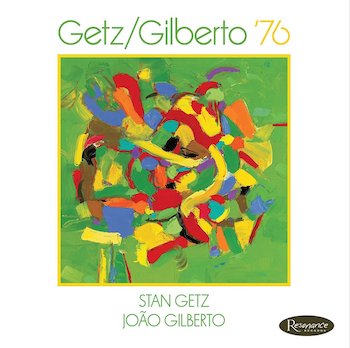
A 2016 release of music from a 1976 San Francisco club date by Stan Getz and João Gilberto. The cover art cleverly recalls the abstract paintings used as covers for Getz’s landmark bossa nova recordings.
Art Blakey & the Jazz Messengers – First Flight to Tokyo: the Lost 1961 Recordings [Hibiya Public Hall, Tokyo, Japan] (Blue Note, 2021), with Lee Morgan, Wayne Shorter, Bobby Timmons
Roy Hargrove and Mulgrew Miller – In Harmony [Merkin Hall, NYC, January 2006 and Lafayette College, Easton PA, November 2007] (Resonance, 2021)
Etta Jones – A Soulful Sunday [Famous Ballroom, 1971] (Reel to Real, 2017) w. Cedar Walton
Lee Morgan – Complete Live at the Lighthouse [San Francisco, July 1970] (Blue Note, 2021) 8 CDs / 10 LPs, including material previously released, with 6 CDs’ worth of unreleased music
George Coleman – In Baltimore [Famous Ballroom, 1971] (Reel to Real, 2017) w. Danny Moore, Albert Dailey
Jaco Pastorius – Truth, Liberty & Soul: Live in NYC: The Complete 1982 NPR Jazz Alive! Recording (Resonance, 2017)
Bill Evans – Some Other Time: The Lost Session From the Black Forest [Villingen, West Germany, 1968] (Resonance, 2016), w. Eddie Gomez, Jack DeJohnette
Stan Getz – Getz/Gilberto ’76 [Keystone Korner, San Francisco, 1976] (Resonance, 2016) with Brackeen, Houston, Hart
Stan Getz – Moments in Time [Keystone Korner, San Francisco, 1976] (Resonance, 2016) with Joanne Brackeen, Clint Houston, Billy Hart
Shirley Horn – Live at the 4 Queens [4 Queens Hotel, Las Vagas, May 1988] (Resonance, 2016)
Thad Jones-Mel Lewis Orchestra – All My Yesterdays: The Debut 1966 Recordings At the Village Vanguard [New York City] (Resonance, 2016)
Sarah Vaughan – Live at Rosy’s [New Orleans, May 1978] (Resonance, 2016)
Larry Young – In Paris: the ORTF Recordings [1964 – 1965] (Resonance, 2016)
Jimmy Giuffre – 3 and 4: New York Concerts [1965] (Elemental, 2014)
Charles Lloyd – Manhattan Stories [Judson Hall, NYC & Slugs’, NYC, 1965] (Resonance, 2014)
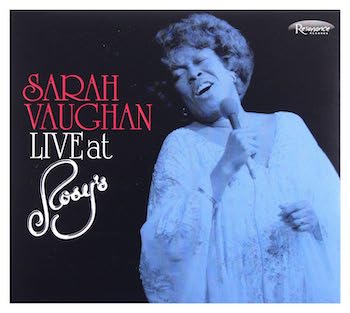 Bill Evans – Live at Art D’Lugoff’s Top of the Gate [Village Gate, NYC, June 1961] (Resonance, 2012)
Bill Evans – Live at Art D’Lugoff’s Top of the Gate [Village Gate, NYC, June 1961] (Resonance, 2012)
Wes Montgomery – Echoes of Indiana Avenue [Indianapolis, 1957 – 1958] (Resonance, 2012)
Profiles of and articles about Zev Feldman:
Nate Chinen, “Jazz Recordings with a Sense of History and Discovery,” [LINK: https://www.nytimes.com/2016/12/05/arts/music/resonance-records-jazz-recordings.html] New York Times, December 5, 2016
Chris Morris, Archival Music Producer Zev Feldman, the ‘Jazz Detective,’ Takes on New Blue Note Role, Variety, January 7, 2019
Michael J. West, Zev Feldman’s lifelong love affair with record stores, Washington Post, April 19, 2022
Andrew Marantz, Raiders of the Lost Archival Jazz Recordings, The New Yorker, November 6, 2023
The final episode in Zev Feldman’s “Jazz Detective” series aired on the Real Jazz channel on the Sirius/XM satellite service on April 25. Feldman hopes that Real Jazz will ask him to do more in the future.
Although Jazz Appreciation Month is rapidly drawing to a close, it is also worth pointing out that Real Jazz on Sirius / XM satellite service made a major commitment of air time to special programming in April.
The history of Record Store Day from its website.
Steve Elman’s more than four decades in New England public radio have included 10 years as a jazz host in the 1970s, five years as a classical host on WBUR in the 1980s, a short stint as senior producer of an arts magazine, 13 years as assistant general manager of WBUR, and fill-in classical host on 99.5 WCRB.
Tagged: Blue Note Records, Elemental Records, Resonance Records, The Jazz Detective

Wow, thanks for such a thorough article!